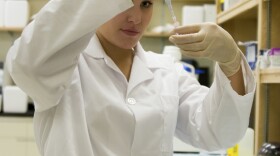
Richard Knox
Since he joined NPR in 2000, Knox has covered a broad range of issues and events in public health, medicine, and science. His reports can be heard on NPR's Morning Edition, All Things Considered, Weekend Edition, Talk of the Nation, and newscasts.
Among other things, Knox's NPR reports have examined the impact of HIV/AIDS in Africa, North America, and the Caribbean; anthrax terrorism; smallpox and other bioterrorism preparedness issues; the rising cost of medical care; early detection of lung cancer; community caregiving; music and the brain; and the SARS epidemic.
Before joining NPR, Knox covered medicine and health for The Boston Globe. His award-winning 1995 articles on medical errors are considered landmarks in the national movement to prevent medical mistakes. Knox is a graduate of the University of Illinois and Columbia University. He has held yearlong fellowships at Stanford and Harvard Universities, and is the author of a 1993 book on Germany's health care system.
He and his wife Jean, an editor, live in Boston. They have two daughters.
-
Some lab studies suggested vitamin D supplements might enhance immunity. But a clinical test in New Zealand found that taking vitamin D didn't reduce the frequency or duration of colds for the people who took the supplements.
-
So far only three people in the Democratic Republic of Congo are known to have contracted Bas-Congo hemorrhagic fever, two of whom died. But the small number means that scientists may have found an emerging disease very soon after it made its jump from whatever species it came from into humans.
-
Patients who had multiple counseling sessions lasting 10 to 15 minutes were 12 percent more likely to quit binge drinking a year later, says a federal task force. Those benefits are enough to justify primary care doctors screening all adult patients for signs of problem drinking and providing counseling, the U.S. Preventive Services Task Force says.
-
They found 40 or so key differences — all potential targets for cleverly designed drugs. But the researchers caution that their study is a long way from the outmoded dream of a silver bullet that would knock out breast cancer – or any other kind. The report was published in the journal Nature.
-
The Swedish team transplanted uteruses from two women in their 50s to their daughters, and an Indiana group is recruiting women willing to undergo womb transplants in this country. It's the latest frontier in a field launched in 1954 with a successful kidney transplant. But one expert cautions against premature enthusiasm.
-
The experimental treatment, which hasn't been tried in humans, encapsulates pure oxygen in microbubbles made of fat molecules. The bubbles look quite a bit like shaving cream, one of the researchers says.
-
The World Health Organization has confirmed 72 cases of the dreaded virus in the Democratic Republic of Congo since May; 23 of them are health care workers. Despite elaborate protective garb and other precautions, it's hard for doctors, nurses and health aides to avoid virus-laden bodily fluids of Ebola patients.
-
The Centers for Disease Control and Prevention is confident the nation has turned the corner on its worst-ever epidemic of West Nile virus disease. Next, scientists will try to figure out what made 2012 so bad.
-
An influenza virus that only infects pigs could very quickly lead to a dangerous flu pandemic in humans, a recent study reports. Results of an experiment in ferrets, a model for flu in humans, suggest that a swine flu virus can mutate into a contagious and fatal disease within 10 days.
-
A recent study found 1 in 10 American men and 1 in 14 women has had a kidney stone. Being obese or diabetic seems to raise the risk of getting them. Now lasers are becoming the treatment-of-choice for kidney stones in academic medical centers.









